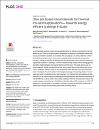Date pits based nanomaterials for thermal insulation applications - Towards energy efficient buildings in Qatar
| Author | Al Marri, Moza Ghorab |
| Author | Al-Ghouti, Mohammad A. |
| Author | Shunmugasamy, Vasanth C. |
| Author | Zouari, Nabil |
| Available date | 2023-06-01T07:31:32Z |
| Publication Date | 2021 |
| Publication Name | PLoS ONE |
| Resource | Scopus |
| Abstract | Air-conditioning systems make the most significant part of energy consumption in the residential sector. There is no denying that it is essential to produce a comfortable indoor thermal environment for residents in a building. The actual goal is to achieve thermal comfort level without putting too much cost on the ecological system by trying to conserve the amount of energy consumed. An effective way to help achieve such a goal is by incorporating thermal insulation in buildings. Thermal insulations help reduce thermal energy gained during the implementation of a desired thermal comfort level. This study aims to use an environmentally friendly nanoparticle of date pits to create thermal insulations that can be used in buildings. Different ratios of the nanoparticle of the date pits and sand composite were investigated. Fourier transform infrared spectroscopy and scanning electron microscopy were used to characterize the new materials. The material with nanoparticles of date pits and 50% by-volume epoxy provided good thermal insulation with thermal conductivity of 0.26 W/mK that could be used in the existing buildings. This has the potential to reduce the overall energy consumption by 4,494 kWh and thereby reduce CO2 emissions of a 570 m2 house by 1.8 tons annually. In conclusion, the future of using nanoparticles of date pits in construction is bright and promising due to their promising results. |
| Sponsor | The publication of this article was funded by the Qatar National Library. The funders had no role in study design, data collection and analysis, decision to publish, or preparation of the manuscript. |
| Language | en |
| Publisher | Public Library of Science |
| Subject | carbon dioxide nanomaterial nanoparticle nanomaterial Article building carbon footprint controlled study date (fruit) date pit energy consumption Fourier transform infrared spectroscopy heat transfer nonhuman Qatar sand scanning electron microscopy thermal conductivity thermal insulation volume analysis building industry building material chemistry developing country economics energy conservation heat hydrogen bond infrared spectroscopy Phoenix (plant) plant seed procedures Conservation of Energy Resources Construction Industry Construction Materials Developing Countries Hot Temperature Hydrogen Bonding Microscopy, Electron, Scanning Nanostructures Phoeniceae Qatar Sand Seeds Spectroscopy, Fourier Transform Infrared Thermal Conductivity |
| Type | Article |
| Issue Number | 3-Mar |
| Volume Number | 16 |
Files in this item
This item appears in the following Collection(s)
-
Biological & Environmental Sciences [794 items ]


